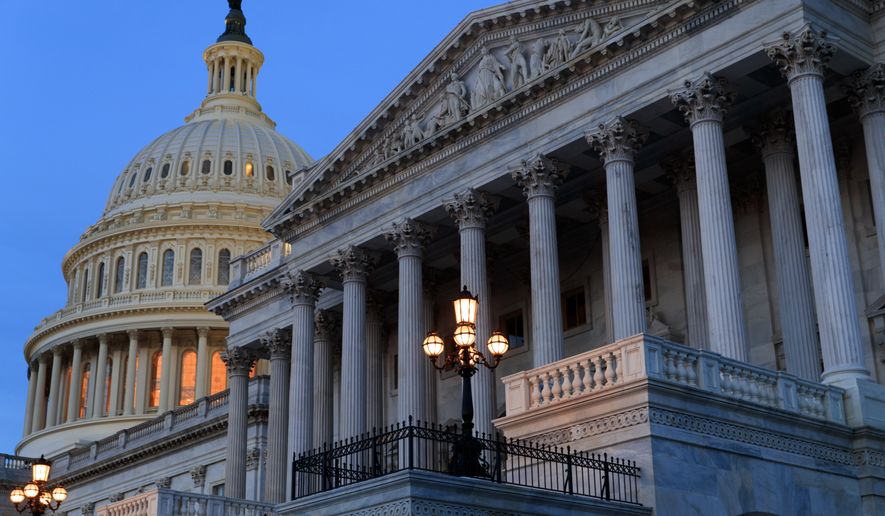Democrats are counting on the GOP’s anti-Obamacare push to wound Republicans heading into the 2018 elections, hoping to rescue themselves for what should otherwise be a very bad year at the polls for Senate Democrats.
Already in the minority, Democrats must defend 25 Senate seats in next year’s cycle compared to just nine for the GOP — and many of those defenses come in states that President Trump easily won last year, such as Indiana, Montana, Missouri, North Dakota and West Virginia.
House Republicans are eyeing runs at several of those states, but Democrats say voters won’t take kindly to those GOP lawmakers’ support for the House Obamacare repeal bill, which would scrap the 2010 health law but result in an estimated 23 million fewer Americans holding insurance a decade from now.
“Members of the House who have announced or are eyeing Senate bids all voted for the plan and are uniquely vulnerable,” the Democratic Senatorial Campaign Committee said in a recent strategy memo.
The DSCC has also been running ads against potential challengers since early May, saying their support for the House plan will force constituents to pay thousands more for drug treatment and maternity care.
Democrats highlighted nine House Republicans who could enter Senate races in several red states and Pennsylvania, a swing state where Democratic Sen. Bob Casey faces reelection.
Democrats also say Rep. Fred Upton, Michigan Republican, will face “special liabilities” for his role in nudging the House bill over the finish line with $8 billion to subsidize sicker Americans who could face higher costs, should he challenge Democratic Sen. Debbie Stabenow.
Republicans, though, say they hope voters will reward their candidates for living up to their campaign promise to repeal the Affordable Care Act.
“I think a lot of people in these states, ones that went hard for Trump, are tired of the fact that no matter who you vote for, nothing gets done,” GOP strategist Ford O’Connell said. “They were trying to show backbone and move the ball forward, so I don’t see how they won’t get rewarded.”
The House approved its health plan, 217-213, brushing aside taunts from Democrats on the House floor. Some Democrats even waved goodbye to their GOP colleagues, predicting massive losses.
It’s the reverse of what happened in 2010, when voters punished House Democrats for passing Obamacare and several other unpopular pieces of legislation, delivering control of the chamber to the GOP.
Recent polling suggests Obamacare is now popular, though, and only 8 percent of the public wants Congress to give final approval to the House bill as-is, according to the nonpartisan Kaiser Family Foundation.
Even before the House vote, Democrats used web ads to target Reps. Luke Messer and Todd Rokita of Indiana for voicing support for the emerging repeal plan, as they plot Senate bids against Democratic Sen. Joe Donnelly.
Rokita spokesman Tim Edson said the congressman would be happy to make the Senate race a referendum on health care, should he mount a challenge.
“Have the delusional liberals at the DSCC set foot outside their elite D.C. bubble in the past eight years?” Mr. Edson said. “ObamaCare has nearly destroyed the Democratic Party from the federal to the local level.”
The DSCC also recently targeted Rep. Evan Jenkins — a West Virginia Republican who last month launched a bid to topple Democratic Sen. Joe Manchin III — with an ad saying the House GOP bill will make substance abuse treatment less affordable.
The ad also targeted Rep. Alex Mooney, another Republican thought to be mulling a challenge to Mr. Manchin, as West Virginia reels from the heroin and prescription painkiller epidemic.
But Mooney spokesman Ted Dacey said Democrats are “wasting time attacking someone who isn’t running for U.S. Senate in 2018.”
Similar ads take aim at Reps. Ann Wagner and Vicki Hartzler, Missouri Republicans who could take on Sen. Claire McCaskill; Rep. Kevin Cramer, North Dakota Republican eyeing a challenge against Sen. Heidi Heitkamp; and Reps. Mike Kelly and Lou Barletta of Pennsylvania, who could vie with Mr. Casey.
A spokesman for Mr. Barletta said he remains committed to replacing Obamacare with a better plan, while an aide for Mr. Kelly said he “would have no problem running on keeping his promise to replace a failed law that is hurting Pennsylvanians.”
Republicans also say Democrats are getting ahead of themselves. The midterms are roughly 18 months away, and the GOP-led Congress is still trying to put a repeal bill Mr. Trump’s desk.
“Democrats would love to use the health care vote as a blunt object,” Mr. O’Connell said, “but it’s very hard to do it when you don’t have a health care bill.”
• Tom Howell Jr. can be reached at thowell@washingtontimes.com.




Please read our comment policy before commenting.